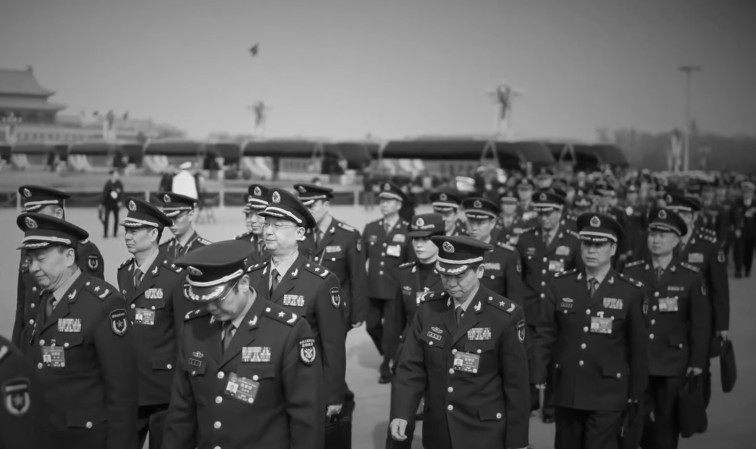Dark clouds hang over Tiananmen Square in Beijing. (Lintao Zhang/Getty Images)
[People News] There has been considerable speculation in overseas political circles about whether a power transition is occurring in Zhongnanhai. The BBC Chinese website cited scholars who analysed that, in order to maintain its regime, the Chinese Communist Party (CCP) must project stability, even amidst intense internal conflicts. It is estimated that only a handful of individuals are aware of Xi Jinping's true situation.
The politics of the CCP has always operated like a black box, with high-level political matters shrouded in even greater secrecy, making it challenging for outsiders to obtain reliable information. Since March, the political landscape in Zhongnanhai has become increasingly perplexing.
Since Xi Jinping took office in 2012, there have been various rumours regarding his health. Some reports suggest he has a liver tumour and has undergone surgery, while others claim he is suffering from pancreatic cancer. In July 2024, there were even rumours that he collapsed during the Third Plenary Session due to a cerebral infarction. Insiders within the party have revealed that Xi Jinping is diabetic.
An article on the BBC Chinese website dated July 21 analyzed that while the severity of Xi Jinping's health may not be sufficient to immediately initiate a succession process, it could be enough to lead the CCP to quietly prepare for the future.
American sinologist David Cowhig referenced these rumors on his blog and raised a thought-provoking question: "The narrative of the successor chosen by Mao Zedong often stirs imaginations about the impending power struggle to succeed General Secretary Xi Jinping (that day will inevitably come)."
On June 30, the Political Bureau of the Central Committee of the Communist Party of China convened a meeting to review the 'Regulations on the Work of the Decision-Making and Coordination Institutions of the Party Central Committee.'
The South China Morning Post reported that an anonymous Chinese political analyst suggested that the new regulations established by the Politburo may be a response to the current critical period of power transition.
Gordon Chang, a senior researcher at the American think tank Gatestone Institute, speculated that the new rules introduced by the Politburo could be intended to limit Xi Jinping's power.
In an interview with the BBC, he stated, "I believe that the senior leadership of the Communist Party is attempting to weaken Xi Jinping's authority, but they want to do so in a manner that does not convey signals of intense internal conflict to the outside world. The party's leaders understand that they must continue to project stability externally."
Chang further speculated that there is significant internal strife within the Communist Party, but only a select few are aware of the true situation.
Dr. Xia Ming, who holds a differing view, told the BBC that he agrees Xi has certain health issues, stating, "The Chinese economy is experiencing a prolonged and severe crisis, which is prompting Xi to respond to the situation through centralization."
As of now, there are no clear indications from Beijing that Xi Jinping is transferring power. Some observers also believe that Xi Jinping may seek to maintain his rule for an extended period or even for life.
However, it has been noted that Xi Jinping has been absent from several important events and meetings. Analysts suggest that Xi Jinping appears to be undergoing a process of "decentralization," as he has started to delegate some significant leadership responsibilities to his trusted aides to further his agenda.
In early July, Premier Li Qiang represented Xi at the BRICS meeting in Brazil, marking the first time in 12 years that Xi Jinping has missed this gathering.
Vice Premier He Lifeng has been recognized as wielding significant influence. According to a report by the American media outlet Asia Sentinel, high-ranking officials within the Chinese Communist Party have disclosed that He Lifeng plays a pivotal role in the China-U.S. trade negotiations, with officials reporting to him instead of to Xi Jinping.
Foreign Minister Wang Yi has also been in the spotlight internationally. During a recent meeting with the European Union, he 'misspoke' by saying, 'China (the CCP) does not wish to see Russia fail in Ukraine,' and added, 'because we do not want the U.S. to redirect all its attention towards China (the CCP).' This statement is interpreted as him speaking on behalf of Xi Jinping.
The new regulations introduced by the Politburo are seen as part of his strategy 'to enhance performance, strengthen legitimacy, and thus prepare for continued tenure,' he stated. △








News magazine bootstrap themes!
I like this themes, fast loading and look profesional
Thank you Carlos!
You're welcome!
Please support me with give positive rating!
Yes Sure!